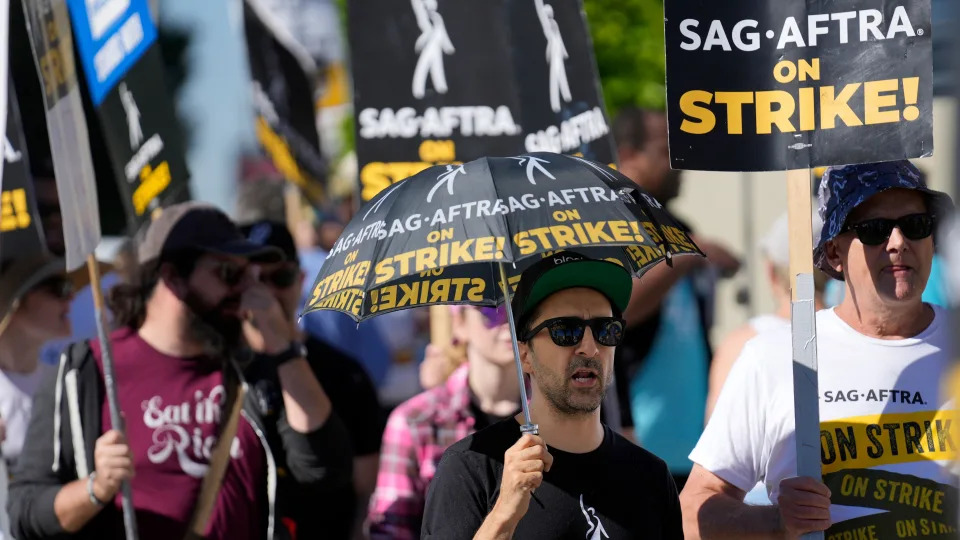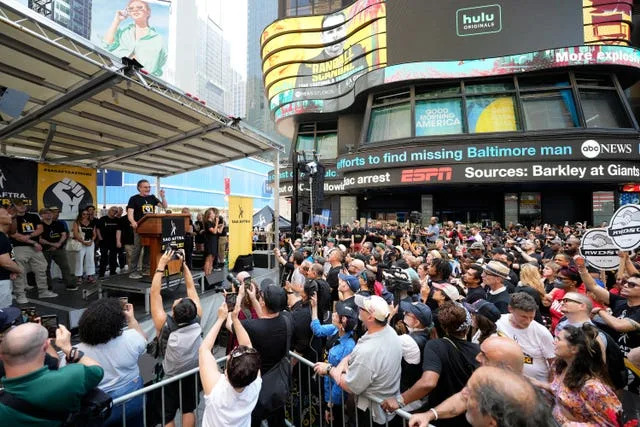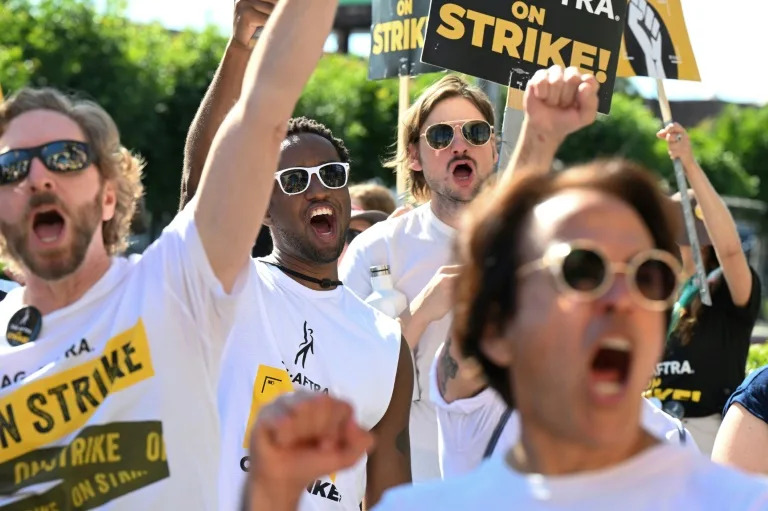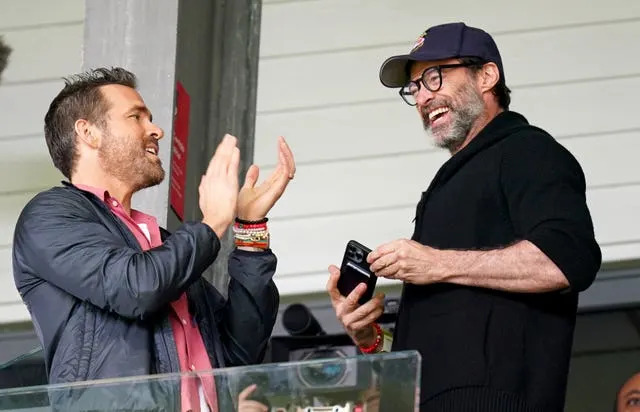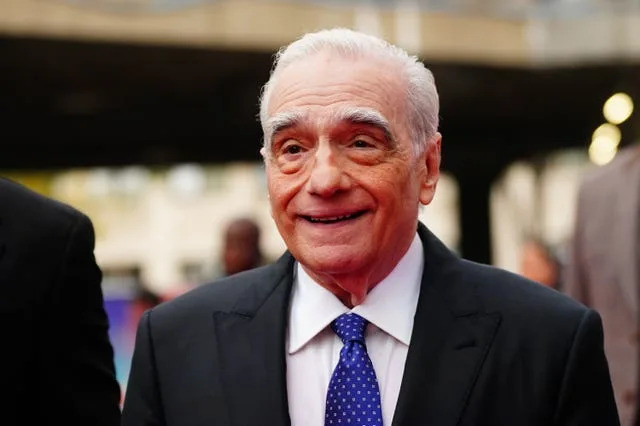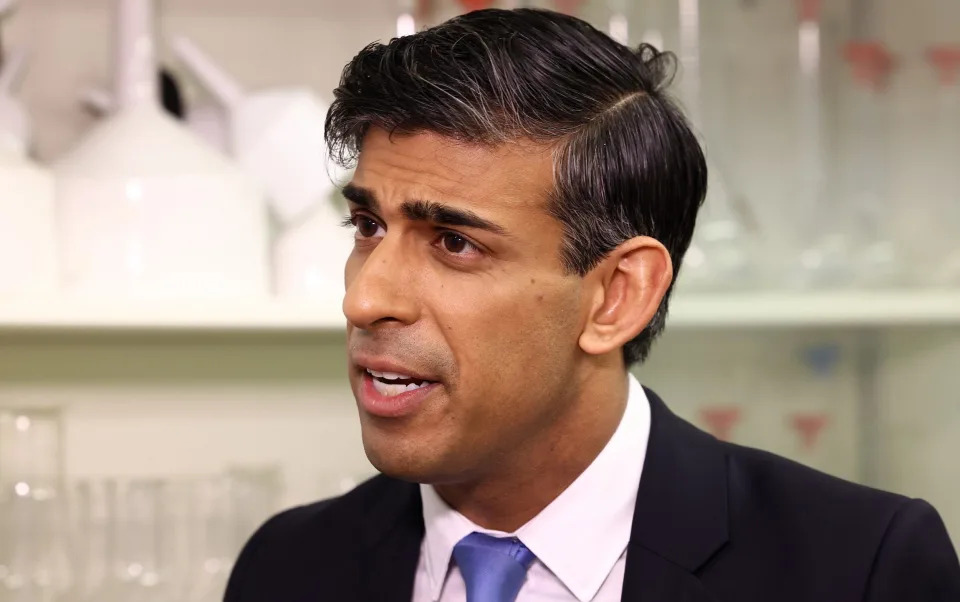Biden to meet with UAW president, tout Stellantis plant reopening
Tue, November 7, 2023
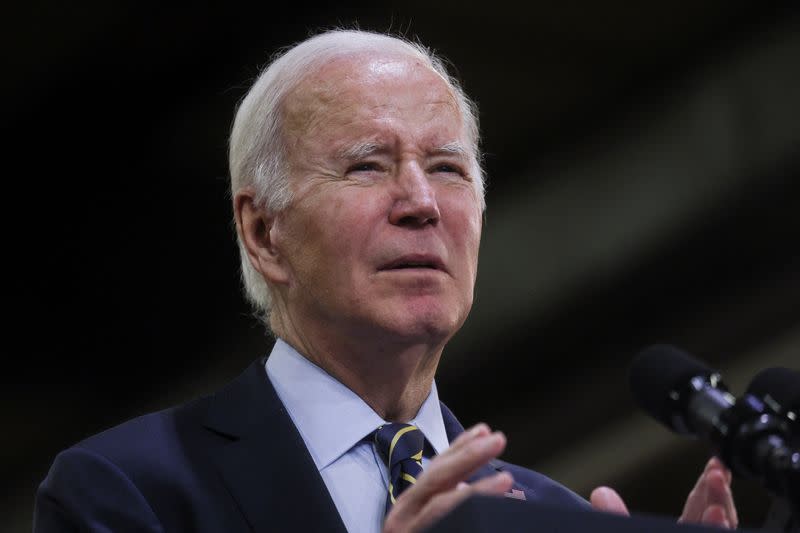
U.S. President Joe Biden visits Amtrak maintenance facility in Bear, Delaware
By David Shepardson and Nandita Bose
WASHINGTON (Reuters) -President Joe Biden on Thursday will meet with United Auto Workers President Shawn Fain and tout the decision of Chrysler-parent Stellantis to reopen a shuttered assembly plant in Belvidere, Illinois, a White House official said.
Stellantis agreed to build a new $3.2 billion battery plant and invest $1.5 billion in a new mid-size truck factory in Illinois under its tentative labor agreement and add 5,000 total U.S. jobs by 2028, the UAW said last week. The labor deals reached with the Detroit Three automakers, which include a 25% pay hike, better retirement benefits and other significant improvements through April 2028, remain subject to ratification votes.
Fain, unlike most labor leaders, has yet to endorse Biden for reelection but has praised White House involvement in the labor talks and Biden's visit to a UAW picket line in Michigan, the first of its kind by a U.S. president.
Biden last week called Fain after the labor deals were announced.
Stellantis, which shuttered the Belvidere assembly plant in February, will begin producing 80,000 to 100,000 mid-size trucks annually in 2027 and the $3.2 billion battery plant with a yet to be named joint venture partner will open in 2028. Illinois Governor J.B. Pritzker will attend Thursday's event, where Biden will make remarks, the official said.
The UAW declined to comment on the event Thursday. Stellantis did not immediately comment.
The new Stellantis investments include $1.5 billion in the Toledo Jeep operations, including building an EV Jeep Wrangler in 2028.
Stellantis will invest $3.5 billion in three Michigan assembly plants, including $1.5 billion in a Detroit plant to updated versions of the Dodge Durango and Jeep Grand Cherokee, including electric versions of those in 2026 and 2027. The UAW said Stellantis wanted to cut 5,000 jobs going into the talks.
(Reporting by David Shepardson and Nandita Bose; Editing by David Gregorio)
What we know about Biden's visit to Belvidere on Thursday
Anthony Ponce
Wed, November 8, 2023

CHICAGO - President Joe Biden is scheduled for a visit to Belvidere on Thursday to celebrate Stellantis' decision to bring the shuttered Belvidere Assembly Plant back online.
The automaker is expected to invest nearly $5 billion to prepare the plant to build what could be a hybrid midsize SUV, although the make and model hasn't been decided yet. Some of that money will go toward building a parts' distribution center and a brand new E-V battery factory next door.
"When the plant was idled in February, it just sort of cut the heart out of the economy," said 11th District U.S. Representative Bill Foster, who credited the robust incentive package offered to Stellantis and pressure from the UAW with paving the way for this move.
"It'll be a huge deal for the region in that you'll have nearly 4000 jobs created here and some of those jobs could start to be created early next year," said White House Communications Director Ben LaBolt.
LaBolt sayid around 2500 of those jobs will be making mid-sized SUVs and another 1300 will be next door building electric batteries at a brand new E-V battery factory.
Foster said the local effort to secure the acres of the land for that facility played a huge role in Stellantis's decision.
"That was crucial. Because a modern automobile factory typically has the battery factory right next to the car factory," he said.
The White House said the President's visit to Illinois is to celebrate a big victory for local autoworkers.
"Auto companies have made record profits in the last few years and the president wanted to make sure the workers building the cars of the future get the wages and benefits that they deserve," said LaBolt.
Stellantis is expected to get the Assembly operational in 2025, with the new E-V battery plant expected to be up and running by 2028. The exact vehicle that's going to be produced is still to be decided.
President Biden coming to Belvidere to celebrate UAW victory
Jeff Kolkey, Rockford Register Star
Tue, November 7, 2023
President Joe Biden is coming to Belvidere Thursday to celebrate a rebirth of the Belvidere Assembly Plant with the United Auto Workers, the Chicago Sun-Times is reporting.
Rumors of Biden's visit had swirled this week as details about Stellantis' agreement to invest nearly $5 billion in Belvidere emerged. Biden, who sided with the union during its "Stand-up Strike," is attending a campaign fundraising event in Chicago Thursday night.
Belvidere UAW Local 1268 workers who staffed the Belvidere plant until Stellantis idled it in February are this week learning details about a proposed labor contract that is said to include 25% raises, cost of living adjustments and the right to strike over plant closures.
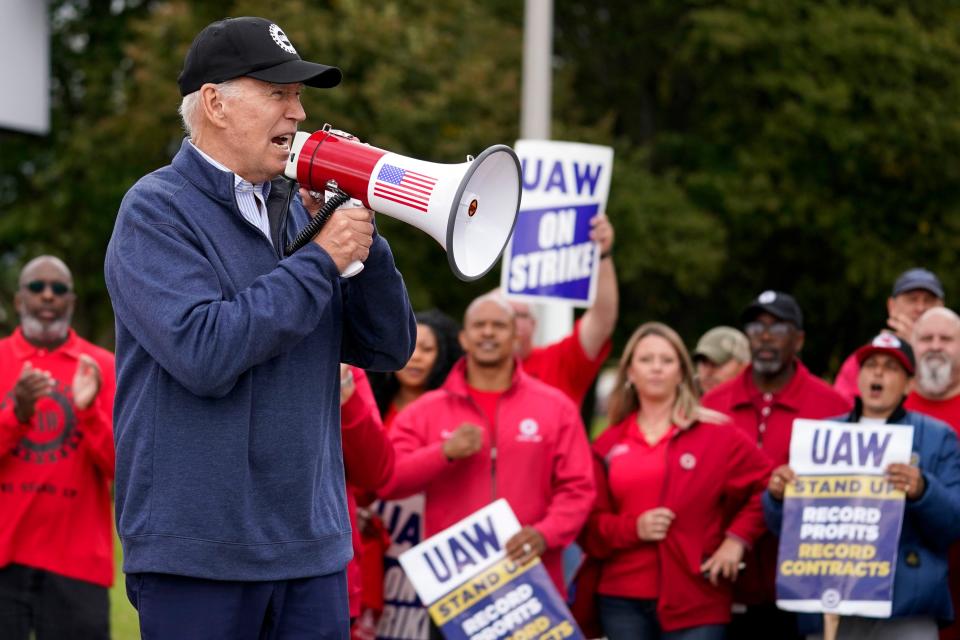
President Joe Biden joins striking United Auto Workers on the picket line, in Van Buren Township, Mich. (AP Photo/Evan Vucci) ORG XMIT: MIEV433
It has not yet been ratified.
Displaced Belvidere workers will have the right to return to the plant. Those who remained will be eligible for pay while the plant is revived.
Plans are to convert at least part of the 5.4 million-square-foot Belvidere Assembly Plant into a $100 million "megahub" parts distribution center, invest $1.5 billion into a new or retooled Belvidere Assembly Plant and spend $3.2 billion on a new battery production facility.
How a $17M land option landed Belvidere the deal of a lifetime with Stellantis
Jeff Kolkey, Rockford Register Star
Wed, November 8, 2023
With a $4.8 billion investment and thousands of jobs hanging in the balance, Illinois Gov. JB Pritzker's office in March placed an urgent call to local officials: At least 300 acres were needed for there to be any hope of saving the Belvidere Assembly Plant.
The land would give Stellantis — maker of Chrysler, Dodge, RAM and Jeep — the space it needed for expansion and construction of a battery production facility.
They turned to the Northern Illinois Land Bank Authority to secure what turned out to be a $17 million option to purchase a pair of parcels west of the Belvidere facility, said Region 1 Planning Council Executive Director Mike Dunn Jr.
"If they couldn't secure that land and tell Stellantis that it was secured, then Stellantis was going to look elsewhere," Dunn said. "We had to move quick, and that's the beauty of the Land Bank. It's a five-county board, so you're saying, 'Hey, this is important for all of us. This has an impact on all of our communities.' These are 3,500 new jobs."
Members of the United Auto Workers Local 1268 will gather this week to vote on whether to ratify a new labor agreement with Stellantis that not only includes raises and cost of living adjustments, but also a bright future for Belvidere including a new midsize truck to build, a battery production facility and a "megahub" product distribution center.
And it comes after several months of uncertainity. Stellantis idled the plant, laying off 1,200 workers, in February.
More: $5B UAW, Stellantis deal could include construction of two more Belvidere plants

State and local officials worked to develop a package of tax and cash incentives in an effort save jobs and revive the auto plant. Led by Rockford Mayor Tom McNamara, Belvidere Mayor Clint Morris and the Northern Illinois Council of Governments, they obtained commitments for property tax abatements.
The state is providing tax credit incentives, workforce development training and more through the Re-Imagining Electric Vehicles Act championed by state Rep. Dave Vella, D-Rockford, and state Sen. Steve Stadelman, D-Loves Park. Pritzker pushed a $400 million "deal closing fund" through the General Assembly that gives him access to cash needed to consummate large investments and compete with other states.
And while state and local officials provided a carrot, the United Auto Workers brought the hammer.
UAW President Shawn Fain and thousands of union workers embarked on a strategic "Stand-up Strike" that placed enormous pressure on Stellantis and the other Detroit automakers to share a portion of the billions in profits they had made in recent years with workers. The union made reviving the Belvidere plant a major point of negotiations.
Pritzker's office on Tuesday would not say how it will pay for the $17 million in land acquisition that would be required for the Stellantis expansion. His office said details of the deal would be revealed once it was finalized.
The state also will reimburse the Land Bank the $200,000 that was needed to secure the purchase options, Dunn said.
Jeff Kolkey via email at jkolkey@rrstar.com and on Twitter @jeffkolkey.
Biden to meet with UAW workers in Illinois to tout deal with auto companies
Tue, November 7, 2023 a

President Biden will head to Illinois on Thursday, where he will meet with United Auto Workers (UAW) president Shawn Fain and union workers to highlight a recent agreement between the union and the Big Three automakers that ended a weeks-long strike.
Biden will travel to Belvidere, Ill., the White House said, where he will deliver remarks and meet with UAW members. Illinois Gov. J.B. Pritzker (D) will also be in attendance.
The president’s visit is intended to “highlight his commitment to delivering for working families and creating good-paying union jobs, as well as the UAW’s historic agreement that includes bringing thousands of UAW jobs back to Belvidere and reopening a plant,” per the White House.
UAW leaders reached tentative deals late last month with Ford, General Motors and Stellantis, bringing to an end weeks of strikes.
The agreements with the auto companies included a 25 percent general pay increase over the course of a four-year contract, increased retirement benefits and more paid leave.
Biden, who has boasted that he is the most pro-union president in history, was steadfastly supportive of union workers and joined striking workers on the picket line in Michigan in late September.
The deal between organized labor and the companies marked a significant win for Biden, who has simultaneously fought for the rights of unions while pushing for more investments in electric vehicles, one of the issues that was at the center of the negotiations between the UAW and automakers.
Olivia Olander
Tue, November 7, 2023
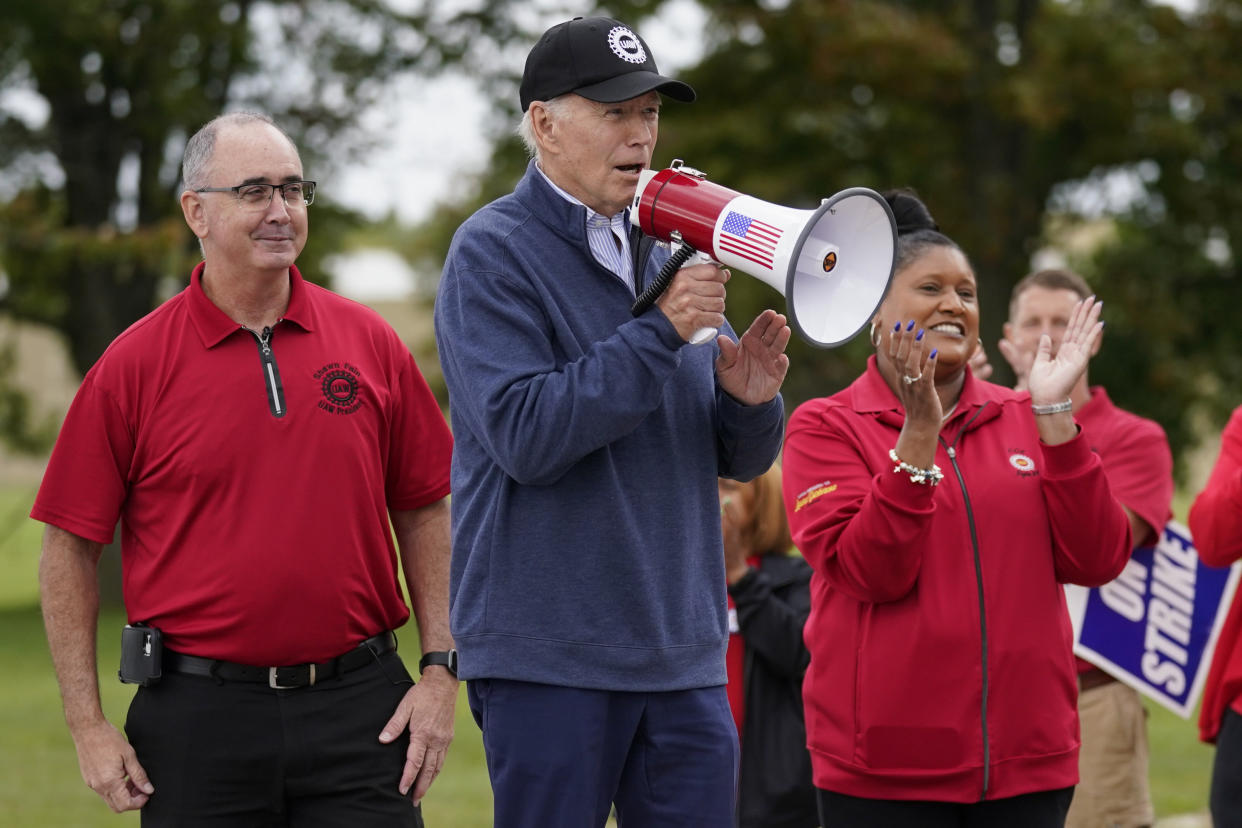
Evan Vucci/AP
President Joe Biden and United Auto Workers President Shawn Fain are scheduled to meet in Illinois on Thursday, the White House said, the latest show of unity between the president and the union, though it has so far held off endorsing his reelection.
The White House said Tuesday that the meeting will take place in Belvidere, where Stellantis agreed to reopen a stalled plant and add additional jobs as part of the tentative contract deal between the UAW and the company late last month.
The UAW also has tentative deals with General Motors and Ford.
Biden showed historic support for the UAW and its demands during the union’s six-week strike, which ended last week pending ratification of the contract offers by autoworkers. Still, the UAW has yet to endorse Biden, making it something of an outlier among the biggest labor unions.
In Illinois, Biden will deliver remarks touting gains in the deals the UAW won, as well as his economic and pro-union policies, according to the White House. He will also meet with other UAW members and Illinois Gov. JB Pritzker, the White House said.
A spokesperson for Stellantis declined to comment on the White House’s announcement.
Biden made history as the first sitting president to join workers at the picket line, when he stood alongside striking UAW members and Fain in September. Biden took a particular interest in the shuttering of the Belvidere plant, and in June met with the head of Illinois-based UAW Local 1268, which represents the plant, POLITICO previously reported.
Biden will meet with United Auto Workers president in Illinois on Thursday
JOSH BOAK
Tue, November 7, 2023
WASHINGTON (AP) — President Joe Biden on Thursday will meet in Belvidere, Illinois, with the head of the United Auto Workers union, and the two leaders are expected to highlight plans to reopen an auto factory that Stellantis wanted to close.
The White House announced in a statement Tuesday afternoon that during the visit, Biden will deliver remarks and meet with UAW members and the union's president, Shawn Fain.
The event will be an opportunity for the president and Fain to publicly showcase tentative contract agreements that ended a nearly 45-day union strike that targeted General Motors, Ford and Stellantis, maker of Jeep, Dodge and Ram vehicles.
Biden will “highlight his commitment to delivering for working families and creating good-paying union jobs, as well as the UAW’s historic agreement that includes bringing thousands of UAW jobs back to Belvidere and reopening a plant,” the White House said.
The contracts, if approved by 146,000 union members in the coming weeks, would dramatically raise pay for auto workers. In the deal with Stellantis, the union was able to save the idled factory in Belvidere, a small city of 25,000 on the northern edge of the state.
Biden made it a mission to cultivate a personal relationship with Fain, inviting him to a private Oval Office meeting on July 19 and calling him last week to wish him a happy 55th birthday. The UAW has yet to endorse Biden as members have yet to fully approve the contracts, making the union one of the major holdouts as other labor organizations have backed the Democratic president.
Illinois Gov. J.B. Pritzker will also attend Thursday's meeting, the White House said.
Under the deal with the UAW, Stellantis agreed to build a new gas-powered midsize pickup truck in Belvidere, plus open a new electric vehicle battery plant in the city. About 1,200 workers will be brought back to the idled plant and another 1,300 will be added at the battery factory.
Wed, November 8, 2023
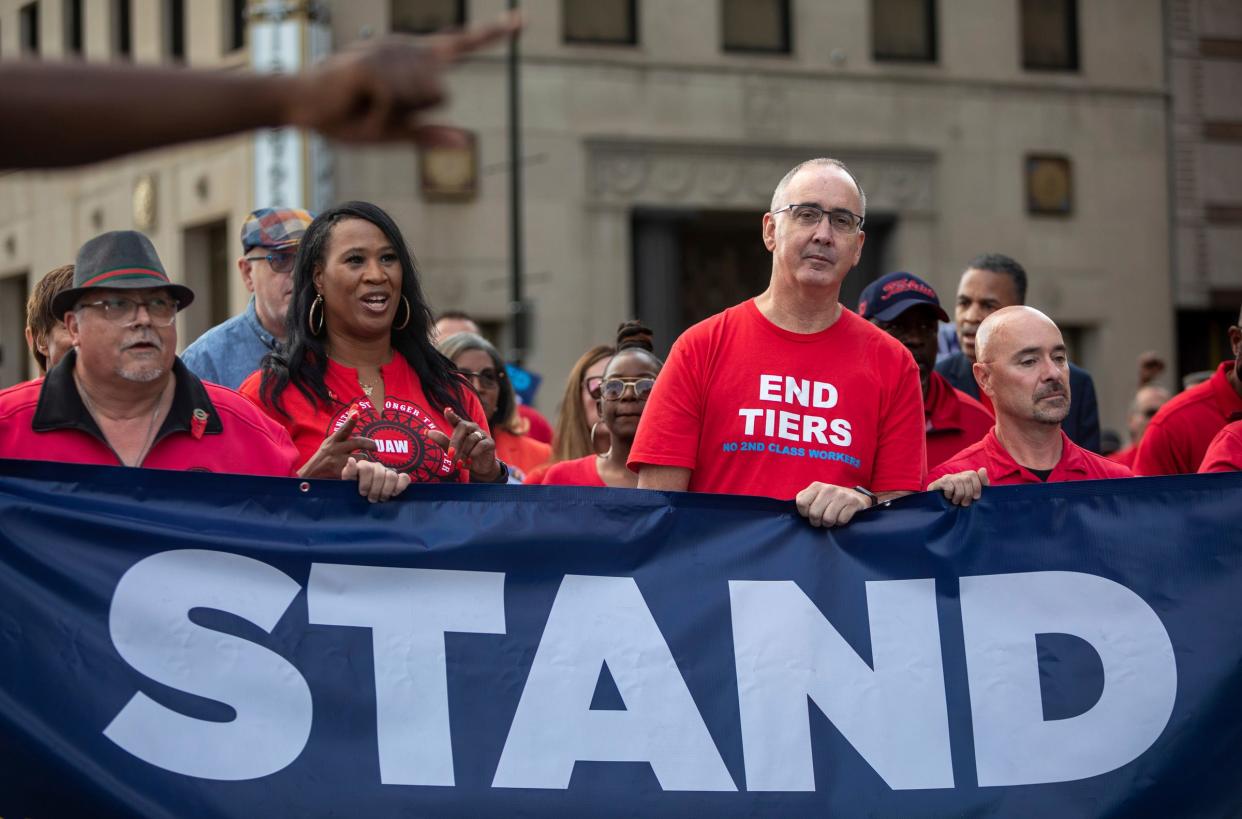
UAW President Shawn Fain marches with United Auto Workers members during a rally in Detroit on Sept. 15. On Wednesday, Fain reflected on the union's targeted strike strategy and the tentative agreements with the Detroit Three that members are now weighing.
UAW President Shawn Fain used a Facebook Live session Wednesday to reflect on the wins in the tentative agreements with Ford Motor Co., General Motors and Stellantis that union members are now weighing as well as the impact of the union’s targeted strike strategy that helped bring about those agreements.
Fain, speaking from a teachers union hall in Chicago ahead of President Joe Biden's planned visit Thursday to meet with Illinois autoworkers, also described what this fight required of UAW members and how it offered a vision of a union energized for battles ahead. Fighting and winning, Fain said, are contagious.
“We needed to fight like we’ve never fought before and win like we’ve never won before. We had doubters, we had naysayers and we had enemies, but we also had champions, we had leaders and we had organizers, and I don’t mean people like me or people on TV or people who wear suits,” Fain said. “I mean you, the workers, the workers who really run these companies, the members who really run this union.”
The strike did something else, too.
“We won back our dignity as autoworkers, we won back our pride in being UAW and being able to wear this label on our chest,” he said, pointing to a union logo on his jacket. “We won back our strike muscle.”
More: UAW gains could rise tide for nonunion autoworkers; Fain calls Toyota boost union 'bump'
Fain, who noted that thousands of nonunion autoworkers have been “inspired by our victory and are starting to organize,” talked about the 25% general wage increases over the life of the contract, the reinstatement of cost-of-living adjustments, a formula which had been “stolen from us” and which the Detroit Three had wanted to “go extinct,” big boosts for long “abused” temporary workers and ways in which the contracts would be a “big first step” toward a just electric vehicle transition for workers. He also touted the ending of numerous wage tiers.
But Fain also described what the union wasn’t able to win in this round of bargaining, something he said amounted to one of the worst tiers — the way workers hired before 2007 could count on pensions and retiree health care and those hired later could not.
“We didn’t win on this issue. The fact is both of these issues are extremely difficult and expensive to fix,” Fain said, while circling retirement security as a key issue when contract talks resume in 2028.
Fain didn’t just leave it as an issue for the three automakers to solve, however, noting that the companies have been focused on Wall Street concerns in this area when it comes to taking on future liabilities.
More: UAW's record raises, perks could have domino effect on other workers
“The Big Three, Wall Street and the federal government are officially on notice,” Fain said, although he did note the current agreements provide improvements for pension benefits and 401(k) contributions.
Fain gave a recap of how talks went, how the strategy allowed the union to play one company against another and how the threat of a strike against the big moneymaker truck plants proved effective. The Detroit Three didn’t understand the strategy and even when they thought they had it down, the union opted to change the rules. He pointed to, for example, the strike at Ford’s Kentucky Truck Plant that came without notice, a move that Fain said “supercharged” the bargaining.
The automakers had “whipsawed” the union, plants and even countries against one another for decades, Fain said, and the union gave them a taste of their own medicine.
“It turns out they couldn’t stomach it,” he said.
The strike strategy took the initial wage offer from 9% to 25% and led to 30 contract offers across the three companies, he said.
More: The big win for salaried UAW members at GM and Stellantis in the tentative agreements
Fain did work in a few references to extreme wealth inequality, a theme he has highlighted often in painting the UAW’s fight for a “fair contract” as a fight of the working class, but that wasn’t his main point here. He pushed back against assumptions that the union was too focused on other agendas, noting that “we were laser-focused on getting the best deal possible for our membership.”
Looking ahead, “the 2028 bargaining," he says, "starts at the conclusion of this round of bargaining. … The fight never stops.”
Contact Eric D. Lawrence: elawrence@freepress.com.
This article originally appeared on Detroit Free Press: Fain talks contract wins, touts pride of being in UAW following strike
Reuters
Wed, November 8, 2023
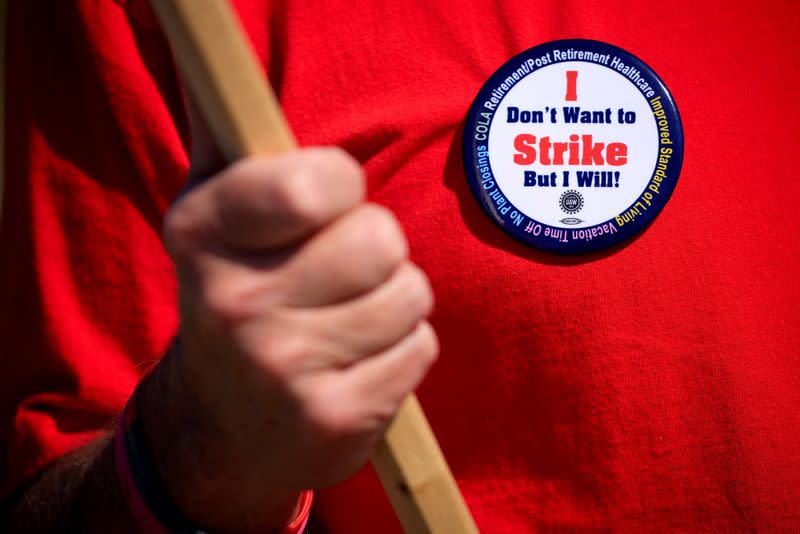
FILE PHOTO: United Auto Workers (UAW) union members picket outside Ford's Kentucky truck plant
(Reuters) -Workers at Ford Motor's Chicago assembly plant have voted to ratify a proposed contract with the automaker, the United Auto Workers (UAW) union's local chapter said in a Facebook post on Wednesday.
UAW Local 551 said 57% of votes cast were in favor of the deal. Ford employs about 4,500 hourly workers at the assembly plant, which also manufacturers the Ford Explorer.
Union workers are voting on contracts from each of Chrysler-owner Stellantis, General Motors and Ford after the first coordinated strike against Detroit's Big Three automakers.
The ratification comes after the automakers and the UAW reached tentative deals over the last few weeks to end a costly strike following marathon negotiations.
The UAW's new agreement, which covers 57,000 workers overall at Ford, includes raises of 33% or more over the life of the contract, including cost-of-living adjustments that push up wages in line with inflation.
A majority of workers at Ford's Michigan assembly plant have already voted to approve the tentative deal.
Automakers had previously been slashing costs and navigating a bumpy road to manufacture EVs and catch up with market leader Tesla. However, lower margins on those vehicles have deterred them from accelerating the move.
Dearborn, Michigan-based Ford in October withdrew its full-year results forecast due to "uncertainty" over the pending ratification of its deal with the UAW union, and warned of continued pressure on electric vehicles results.
The company has previously estimated that the new contract would add $850 to $900 in labor costs per vehicle.
(Reporting by Nathan Gomes and Shivansh Tiwary in Bengaluru; Editing by Sriraj Kalluvila)
View comments
UAW president takes victory lap on new deals, seeks to jumpstart new labor movement
Jack Nissen
Wed, November 8, 2023

(FOX 2) - The UAW president took a victory lap Wednesday when he summarized both the small details of the autoworkers' latest contract with the Detroit three, as well as bigger plans for the labor organization's future.
At one point during Wednesday's afternoon press conference, he stamped the agreement as a victory for bargaining when he said Ford, General Motors, and Stellantis would pay each worker that went on strike for each day they picketed.
"For first time in UAW history, the big three had to pay us back for striking them," Fain said. "That's when you know you've won."
In exchange for the extra pay, which adds up to more than $100, union leadership agreed to send workers back to the assembly line as local groups voted on ratifying the proposed agreements. Before the negotiated contracts can go into effect, UAW members must approve the agreements within their respective organizations.
In total, they were offered 30 contract proposals as the UAW sought to keep the three automakers off balance. They even switched up their strategy by surprise striking each of the three companies, starting with Kentucky Truck Plant.
The strike lasted more than six weeks and cost the industry more than $10 billion in wage and production losses. But in return, Fain argued the contracts added up to the biggest gains the UAW had seen in years. It also provided a new strategy for how strikes my happen in the future.
He also alluded to a larger plan to jumpstart a labor revolution, saying the latest stand-off wasn't just about a new contract, cost-of-living adjustments, tiers, or battery jobs. "It's about a big-picture vision."
"We didn't just win back wages and benefits, we won back our power," he said.
Keith A. Owens
Updated Tue, November 7, 2023
UAW President Shawn Fain deserves a lot of credit for the success of his "Go Big Or Go Home" contract negotiation strategy, and I believe in giving credit where credit is due. He swung for the bleachers when more than a few folks were wondering if maybe Shawn was kinda nuts asking for the things he was asking for. A 40% pay raise? Please. Get real, Shawn. Seriously.
OK, so when it was all said and done, he didn’t get a 40% raise for his union members (his opening ask was based on the 40% pay raise already received by automotive corporate CEOs over a three-year period); he got them a 25% raise. Some of them even got more. When was the last time your paycheck got a 25% bump?
Yeah. Exactly. And if Fain had asked for 25% to start off the negotiations, they would have called that crazy, too.
I think we can agree now that Fain wasn’t crazy; Fain read the room. Fain knew why he was elected to lead the UAW, and he wasn’t elected to play nice with corporate. He was elected because the membership had been getting fed up for a long time. They were getting fed up as they watched corporate profits and corporate raises continue to skyrocket while their own paychecks remained stuck in park. Ultimately, that rumbling and grumbling about what was so obviously unfair boiled over into open dissent.
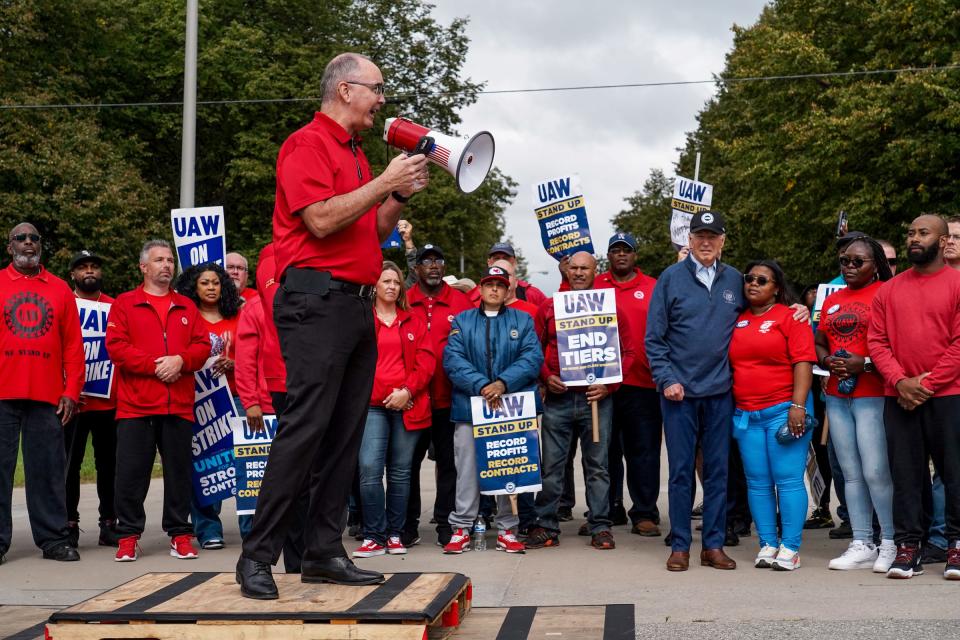
President Joe Biden stands with workers picketing as UAW President Shawn Fain speaks at General Motors Willow Run Redistribution in Belleville on Tuesday, September 26, 2023, during a stop in Michigan.
It’s not complicated. Fain was saying to corporate, on behalf of the membership, “Hey, you guys seem to be doing OK, right? Seems to me you’re doing OK largely because of the work my guys are doing. Only my guys are not doing OK. So I think we need to fix this. Because with the money you’re making, we should all be doing OK.”
Which is pretty much what the union movement has always been about, which is why now would be a good time to step back into automotive history for a moment (and yes, I’m well aware of the corruption that plagued unions too often in later years, but unions hardly invented corruption and corruption hardly defined what unions were — and are — all about).
Anyway, Henry Ford hated unions. Hated them. Not a secret. Employed all kinds of measures — including hiring a known bruiser and thug named Harry Bennett, and putting him and his army of leg-breaking goons on the payroll — to intimidate strikers and derail the union movement.
Indeed, Ford was the last auto company to agree to unionization. And that was because Henry’s wife, Clara Bryant Ford. After witnessing the notorious Battle of the Overpass, where Bennett’s goons beat strikers bloody, Clara told her husband that if he didn’t put an end to these bloody tactics, she would leave him. This was in 1941.
And actually, Clara’s threat was so potent that Henry wound up giving his workers a better deal than either GM or Chrysler. It was the deal in which Henry implemented the automatic deduction of union dues from workers’ paychecks. This turnaround happened only hours after Ford had initially said he would fight against unionization to the bitter end, and would never give in.
Yeah, well.
But it was also Henry Ford who lured workers to Detroit to work in his plants by offering a $5 a day wage for any and all workers – including Black workers. For working people — especially Black working people — $5 a day was unheard of. And so they came, a flood of races and ethnicities, to labor in Detroit’s auto plants.
And no, it wasn’t all rosy and "We Shall Overcome" by any means. The Black workers routinely got the worst and most dangerous jobs, and once the plants became unionized, it was another long and brutal fight for Black laborers to be allowed into those ranks. Former Mayor Coleman A. Young was a prominent labor activist who was heavily involved in getting those rules changed.
But even with all the negative side effects that came with working in an auto plant, the fact is that the auto industry in Detroit was instrumental in helping to create one of the largest Black middle-class populations in the nation percentage-wise — if not the largest. And for years — up until fairly recently when the rate of Black homeownership dropped dramatically — Detroit also had one of the highest percentages of Black homeowners anywhere in the country.
In Detroit, blue-collar workers were making enough money not simply to get by, but to raise a family and enjoy a comfortable life. And that’s because part of Ford’s strategy was to pay his workers enough so that they could afford to purchase the cars that they were building. Not out of the goodness of his heart, but because that helped the company sell more cars. And because hundreds of employees as satisfied customers driving their brand new Fords off the lot and into their respective neighborhoods to show off to their families and friends was about the best unpaid advertising you could ask for.
This massive re-ordering of society came about because of an admittedly imperfect visionary who revolutionized the entire world when he put that world on wheels via the mass production of the automobile — and the audacity of a union movement that believed owners shouldn’t be the only ones allowed to benefit and profit from that industry.
Shawn Fain read the room, and the writing on the wall was clear; it was time to remember why workers fought — and died — to create a union in the first place. It was time to get back to their roots.
Keith A. Owens is a local writer and co-founder of Detroit Stories Quarterly and the We Are Speaking Substack newsletter and podcast.

Keith Owens in the Detroit Free Press photo studio in downtown Detroit on Thursday, Oct. 5, 2023.
Wed, November 8, 2023
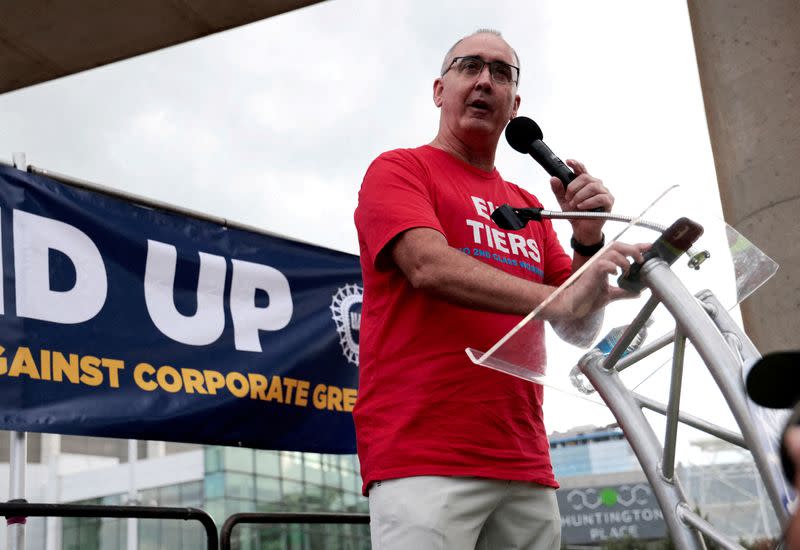
FILE PHOTO: United Auto Workers President Shawn Fain addresses the audience during a rally in support of striking UAW
By David Shepardson and Joseph White
(Reuters) - United Auto Workers President Shawn Fain said on Wednesday the union will "pull out all stops" in working to organize non-union U.S. auto plants after winning new contracts with the Detroit Three automakers.
Fain will join President Joe Biden on Thursday in Belvedere, Illinois to tout Chrysler-parent Stellantis decision to reopen a shuttered assembly plant there. In an video interview at the Reuters Events auto conference in Detroit, Fain said the UAW is aggressively working on its organizing plans.
"We're going to pull out all stops. We're going to leverage every avenue we can and we're going to find creative ways to get to workers," Fain said. "We're going to employ everything we can to support workers and give them what they need."
He said hundreds of autoworkers at nonunion plants have reached out to the UAW seeking to join.
Fain said the UAW deserved credit for Toyota Motor decision's last week to raise the wages of nonunion U.S. factory workers. He said previously Toyota hiked wages "because the company knows we're coming for 'em."
Days after the UAW won major pay and benefit hikes from the Detroit Three automakers, Toyota announced that hourly manufacturing workers at top pay will receive a wage hike of about 9% effective on Jan. 1 and cut the time needed to get top pay from eight to four years.
The UAW has tried and failed for years to organize nonunion U.S. auto factories, most of them built by Asian and European legacy automakers in southern U.S. states where so-called "right to work" labor laws make it optional for workers to pay union dues.
"When we return to the bargaining table in 2028, it won’t just be with the Big Three, but with the Big Five or Big Six," Fain said.
Fain praised Biden administration officials for helping the union win agreements with the Detroit Three automakers to ensure battery plant workers get higher wages and benefits.
Fain and Biden on Thursday will tout Stellantis decision to build a new $3.2 billion battery plant and invest $1.5 billion in a new mid-size truck factory in Illinois under its tentative labor agreement. The UAW has not yet endorsed Biden for re-election saying it is focused on winning ratification of the labor deals.
"We're going to make endorsements at the proper time," Fain said.
(Reporting by David Shepardson and Joseph White; Editing by David Gregorio)
Ben Mathis-Lilley
Wed, November 8, 2023

Photo illustration by Slate. Photos by Leon Neal/Getty Images and Bill Pugliano/Getty Images.
The United Auto Workers union has been taking victory laps since securing a big raise for its members in new contracts with the Big Three automakers—and according to UAW president Shawn Fain, it will be turning immediately to efforts to organize not just the foreign-owned vehicle manufacturing plants of the South but Elon Musk’s Tesla as well.
Have Fain and the union been reading too much of their own press? The new deals with Ford, General Motors, and Stellantis—struck after a 45-day series of selective “stand-up” strikes at individual plants—have been widely hailed as wins for workers and are expected to be officially ratified by members in voting this month. But every previous attempt to organize the southern plants owned by Toyota, Honda, and others has failed—as did initial moves in 2016 toward forming a union at Tesla, whose CEO has only grown more unpredictable and confrontational in the years since.
Slate spoke about the situation with Marick Masters, a professor of business at Wayne State University in Detroit who thinks Fain and the union have probably earned the praise they’re getting—and that their ambitious pivot may be a matter of necessity rather than hubris.
Ben Mathis-Lilley: There’s been a lot made of the UAW’s public relations strategy before and during the recent strike. Shawn Fain uses a lot of class-warfare rhetoric and was very transparent with both his members and the general public about what was going on in negotiations. Do you think the attention this approach has been getting is justified?
Marick Masters: I think the approach was a major success for the union. It was able to achieve a large part of what its original objectives were; it didn’t achieve everything, but some of the goals weren’t realistic possibilities under any circumstances. It was a sophisticated media campaign—they were able to use their political influence to apply pressure on the companies to make concessions that they would not have made otherwise. And their next task, organizing foreign plants and electric vehicle plants, is going to require that they be as savvy and unconventional as they were during this strike.
Is there a limit to the effect that public pressure can have during a strike, vis-à-vis the economic fundamentals—how long manufacturers believe they can afford to hold out?
I could picture someone making a case that a lot of this is window dressing, and what really matters is exactly what the company thinks they can bear as far as lost production and what they need going forward for investment. Certainly there has to be impact behind the voice, and if you’re just out there making your case and hoping for the best, that’s not going to be an effective approach. But what the union did was time things. It coordinated its public voice with the strike activity to put the companies on the defensive. It got public opinion behind it with the president coming out here and visiting, and the companies know that to a large extent they’re being subsidized by the government on this transition to electric vehicles. They’ve got to think about the consequences of whatever they do with respect to the labor movement when you have a president who said that he’s the most pro-union president in American history.
What do you mean by “time things”?
They didn’t just have spontaneous deadlines. They made their demands, they waited for the companies to make their first counteroffers, and then they said, “Well, we’re not changing our demands to meet those. We’re waiting for you to come back with another offer.” And another offer. And another offer. And then the strike deadline occurred and contracts expired, so they started to strike. They phased in the strikes to ratchet up the pressure, and at each deadline they waited for another concession. They forced the companies to make a series of concessions, then pocketed them and said, “We’re going to wait until you make another one.”
So it was a smart public strategy, but it wouldn’t have had any effect if the threat of the strike wasn’t real, and they ratcheted up the pressure until they convinced the employers that they could continue striking until they struck on a companywide basis.
How do you think the foreign automakers and Tesla will respond to being openly targeted like this?
The opposition won’t only be in the form of public resistance. If the UAW shows up and tries to organize, if it is able to get a showing of interest in holding a certification election, you can rest assured that the companies are going to fight that tooth and nail. But they’re also going to be proactive and do, for example, what Toyota did, raising wages 9 percent. They’ll be looking at things from wages to benefits to health and safety conditions, trying to keep themselves out of the news. They don’t want adverse publicity in terms of safety dangers or those kinds of things. They might be behind the scenes talking about the virtues of their company and doing lots of things to make workers feel better, things that don’t necessarily ever get a lot of public attention but nonetheless are taking place.
The union is also going to have to contend with the fact that it brings a lot of baggage. The nonunion automakers will use every conceivable means to convince people that if they’re in the union, they’re gonna have the same fate as the workers at the Detroit Three, where the workers are treated sort of like a yo-yo and they give things to them, then take them back, and that in the midst of all that, the continuing reality is downsizing.
Do you think Tesla will respond to this any differently than the others simply because Musk is so drawn to conflict?
I don’t think there’s any way to keep Elon Musk out of any major decision at his company. But he’s very smart, he’s very sophisticated. He wants what’s best for the business, and himself, and so I think that he will take stock of the situation, probably hire the team he needs to hire to help him convince the workers that it’s not in their interest to have a union, that they’re involved in an enterprise in which their long-term welfare will not be served by one.
Were you surprised that Fain went directly to talking about taking on the foreign and EV manufacturers? Could he be getting overconfident?
The UAW has been vocal about organizing them going back to at least 2010, but what’s different about this time is that they’ve got a contract with the Big Three which they believe they can use to their advantage. Fain also has a base within his union that’s pressuring him to organize these facilities, realizing that’s really the union’s key to the future. And perhaps even more fundamental is that this makes it known that they’re looking for opportunities to organize. They would hope that maybe this kind of public announcement would encourage people to come forward at the plants and say, “We’re interested in having your representation.”
